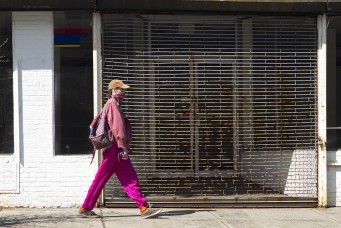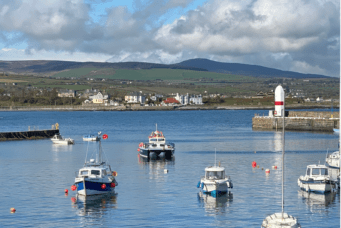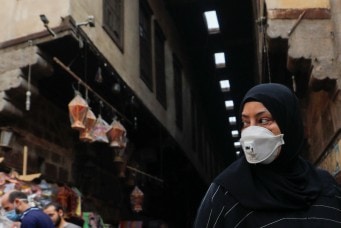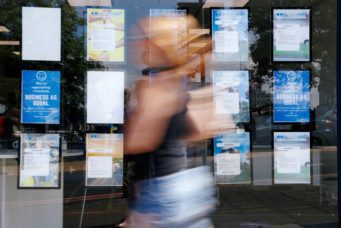Reviving Botswana’s Tourism Industry after COVID-19
Countries which depend on tourism as a major revenue source have been struggling in the wake of the COVID-19 crisis.
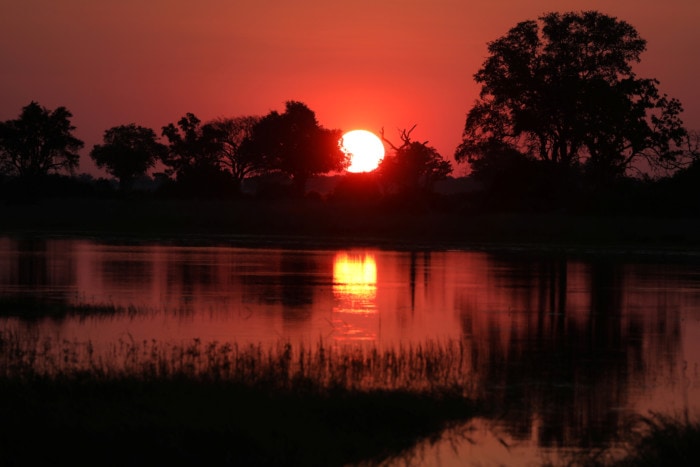
The sun sets over the Okavango Delta, Botswana, April 25, 2018. Mike Hutchings/Reuters
The Botswana tourism sector cannot avoid the threats posed by the current coronavirus disease (COVID-19). Considering that tourism relies on physical interaction between people, it does not come as a surprise that the sector has borne the brunt of the global pandemic. In May 2020, the United Nations World Tourism Organisation (UNWTO) anticipated a 58 to 78 percent decline in tourist arrivals. UNWTO further observed that Small, Medium and Micro Enterprises (SMMEs) will be particularly impacted. The SMMEs make up around 80 percent of the tourism sector globally. In southern Africa, the sector has seen a dip in website traffic and business on airlines, travel agents, hotels, and tourist destinations.
Botswana recorded its first three confirmed cases of COVID-19 on March 30, 2020. As of June 22, there have been eighty nine confirmed cases. Even though the disease spread in Botswana is low compared to other countries, the economic repercussions have been far reaching within the tourism sector. This is worrisome considering that the sector is the second largest revenue earner in the country. Dependence on the international market has made the sector vulnerable to the effects of the disease outbreak, as the main countries from which tourists come were among the most affected by the global pandemic.
Of the 1.8 million tourist arrivals recorded in 2017 in Botswana, 84 percent were from Africa while the remaining 16 percent were from countries such as the United States, Germany and the UK. However, revenues from overseas far outweigh those from the African continent due to the country’s high value/low impact tourism strategy—with the goal of minimizing environmental impacts and at the same time maximizing socio-economic benefits.
Due to the fact that travel and tourism go hand in hand, the sector started feeling the pinch as soon as international travel restrictions began and countries around the globe started imposing entry bans, especially for citizens of or recent travellers to the most affected areas. According to a snap survey conducted by the Botswanan Local Enterprise Authority (LEA) covering 382 SMMEs, the tourism sector suffered a 72 percent revenue loss in March 2020. Furthermore, of the 382 SMMEs surveyed, 209 had loans and the tourism sector accounted for 61 percent of the loan balance. This paints a bleak future for the companies should they not prove resilient enough to bounce back from COVID-19.
Specifically, the industry has suffered a loss of revenue and a failure to service bank loans, finance operational costs such as wages and rent payments, and a loss of opportunities aimed at community development. It is therefore evident that the underlying driver of these problems is loss of income by the travel and tourism operators.
The SMMEs are mostly hard hit because their working capital is largely financed through prepaid bookings. Consequently, as clients cancelled their bookings, they demanded refunds which companies could not afford. Furthermore, most tourism businesses operate on bank loans which need to be serviced monthly in addition to other expenses such as staff salaries and other bills. Therefore, loss of revenue resulted in some operators not being able to honor their contractual obligations toward their financiers. Some travel and tourism SMMEs operate from rented facilities and lack of income has resulted in some being unable to pay their rent. Some companies have had to release their staff due to lack of business. While some sectors may easily convert to working from home, this is not plausible in the tourism sector because of the nature of the business which requires physical interaction with clients.
Botswana’s Community Based Natural Resources Management (CBNRM) program brings together community stakeholders to establish sustainable economic development, which takes into account biodiversity conservation. The 2014 hunting ban resulted in a loss of income for communities involved in CBNRM.
In 2019, however, the government made a research-based and informed decision to lift the hunting ban, creating new opportunities for community development. Safari hunting forms part of tourism and communities had already made agreements with international safari hunting operators to take advantage of this year’s hunting quota. However, this supposed boon to tourism has failed to materialize given global travel bans. In an April 27 press statement, the CEO of the Botswana Tourism Organisation noted that hunting may only take place toward the end of the year, or even next year.
Only then will Community Trusts, which manage community-based resources and tourism services, and their clients be able to honor their agreements. This has dealt a significant blow to tourism-dependent communities in northern Botswana, especially in areas where photographic safari has proven unprofitable. Their livelihoods had already dwindled following the 2014 hunting ban.
As countries begin to open their economies, there is a delicate balance between saving lives and rebooting the economy. The UNWTO perceives tourism as a key sector that will support livelihoods and create opportunities for millions of people around the globe in the post-COVID-19 world, and is in line with the UN’s global sustainability agenda. Not only is COVID-19 a health challenge, it is also a social and economic emergency.
Therefore, there is a need for tourism-dependent countries to put in place mitigation measures to curb the socioeconomic impacts of the pandemic. The UNWTO encourages countries to prepare to recover from the effects of the pandemic by focusing on the following areas: managing the crisis and mitigating the pandemic’s impact; providing stimulus and accelerating recovery; and preparing for the future. The government of Botswana has already laid the groundwork along these mitigation areas.
Botswanan leaders have introduced some economic and fiscal relief initiatives in response to COVID-19. The tourism sector is eligible to benefit from this assistance as part of managing the crisis and mitigating its impact. Among other things, the initiatives aim to support workers and stabilize businesses. Immediate measures include the establishment of the COVID-19 Relief Fund. The funds will provide wage subsidies for companies that have been affected by the pandemic. The wage subsidy covers 50 percent of the basic salary of employees between BWP 1,000 and BWP 2,500 ($84 and $208 respectively) per month from April to June. The goal is to retain as many jobs as possible considering the already high unemployment rate in the country, which, prior to COVID-19, stood at 20.7 percent.
As part of managing the crisis, the government also introduced a “do not cancel but postpone strategy,” where pre-booked clients were encouraged to postpone their trips instead of cancelling them altogether. In order to provide stimulus and accelerate recovery, the government introduced a loan guarantee scheme for 24 months, up to a maximum of BWP 25 million ($2 million) per business. Post-COVID-19 plans include an economic stimulus package to boost the economy from which the tourism sector will also benefit.
Despite these efforts, estimates show that some subsectors of the tourism sector may take a year or more to recover. There are some lessons to be learned as the industry prepares for the future. These include the importance of insurance that covers business interruptions caused by public health crises. Clearly, a dialogue is needed between the tourism industry and the insurance sector which currently concentrates on insurance that only covers physical damage caused by disasters, such as floods and fires, and not the effects of pandemics.
In conclusion, it has become apparent that not only is it necessary to put in place mechanisms that will enable tourism SMMES to bounce back from the effects of COVID-19, a transformational agenda with implementation timelines is also necessary to protect the industry against future pandemics. This includes investing in domestic tourism which has, up to now, not received the attention it deserves due to the exclusive nature of the “High Value-Low Impact” tourism policy adopted in Botswana. These changes will come with diversification of the tourism product away from wildlife-based tourism to include other products that will be more appealing and affordable to the domestic market.
This article was written as part of the Addressing Global Crisis Project (AGC), which is run by the University of Central Florida’s Office of Global Perspectives & International Initiatives (GPII). AGC examines how governments, individually and collectively, deal with pandemics, natural disasters, ecological challenges, and climate change. AGC is organized around five primary pillars: (1) delivery of services and infrastructure; (2) water-energy-food security; (2) governance and politics; (4) economic development; and, (5) national security. Through its global network, AGC facilitates expert discussion and features articles, publications and online content.

